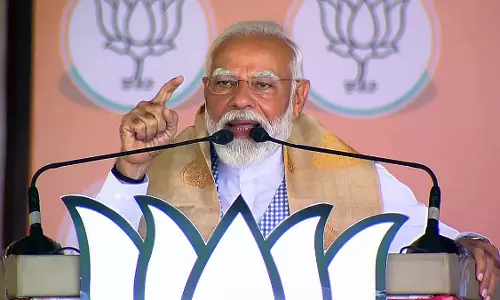
When US tries to squeeze India
text_fieldsThe US decision to exclude India from the Generalised System of Preferences (GSP), that is offered to developing countries, will adversely affect India in diplomatic and economic domains. President Donald's announcement that prohibits India's tax-free exports to US worth 5.6 billion dollars, also speaks for New Delhi's weakness in its foreign policy.
This 'retaliatory' move by Trump comes at a time of India-Pak stand-off, and when every move by US is portrayed as proof that US is India's bosom friend. The GSP, a scheme of granting certain countries special concessions including tariff-free imports, was introduced in 1976. Trump's announcement to exclude India from that is part of his policy decisions to reduce America's trade deficit. It will take two months for the decision to come into effect. Even as the ministry of commerce asserts that within this period, the matter will be resolved through negotiations, given that both sides are in no mood to compromise, a negotiated settlement does not look that easy.
Some of the recent trade decisions taken by India were unfavourable to US-based online wholesale companies and pharma companies. India imposed restrictions on the business of giant firms like Amazon, Flipkart and Walmart. There were also clear directives on online financial transaction gateways like Mastercard and Visa - to desist from transferring data about their customers out of the country. On the other hand, India did not fully accept either Trump's proposals that India reduce the import tariff of therapeutic medical equipment, farm and dairy products and certain technical products. Such 'levelling' acts were intended as a 'punishment' to India for its refusal to accept the unilateral proposals from US which aimed at giving full comfort to the US market. Although Modi government was prepared for some flexibility, the businessman in Trump was not satisfied with any of them, as the new decision makes clear.
The average import tax in India is between 10 and 14 per cent, as against that of US which is below 4 per cent. If both countries decide to equalize them, the revenue of India is sure to come down. As a corollary, Indian markets will see a huge influx of US food and farm products. Indian pharma companies may not be able to complete with American pharma giants. But the Indian trade market, with 250 million of them in the rich segment, cannot be easily ignored by the US. It is with full knowledge of this, that India has been following a protectionist policy. The US motives and moves are obvious as evinced when America demanded full access to India's market, in the matter of Harley Davison imports to India, and now that of other products. Trump is trying pressure tactics to achieve these ends.
Himself a business tycoon, Trump has already faced the allegation that the driver for his aiming at the President's office was his own business interests rather than of his country, allegations that were proven by his subsequent acts. Even after becoming the president, his focus has been to widen his own commercial dreams, as has been clear from a review of his foreign policy. And now he is using his office to inflate those commercial dreams with ultra-nationalist sentiments, thereby to steal the minds of Americans - all intended to ensure another term in office for himself.
Exports to America, as per statistics of last December, which form 15 per cent of India's total exports, were to the tune of USD 46.1 billion. India, which is the biggest beneficiary of duty-free exports, currently delivers 1,900 products under the benefits of GSP. What we hear now is actually the answer to the question what Narendra Modi's BJP government, which attaches great value to its friendship with Trump and keeps boasting of it loud, is winning back from the US on the strength of bilateral relations.
But this is not the first blow by Trump. Earlier the US visa restrictions imposed by Trump had affected the IT industry of India. Although some interventions were made at that time, they have not got anywhere so far. Probably with dampened morale in that context, India has been showing a cold response to the new decision. For, the commercial affairs secretary's statement is that GSP concessions are applicable only to products worth US 19 Cr, and that the decision will not seriously affect Indian exports. Beyond this, the Centre does not have any action plan to counter it. What India should attempt to do is to take note of the fact that big powers that insist on opening up alien markets are now impoverished, to discard their diktat and try to to widen its international market including Africa and Latin America where currently only a fraction of our exports go. That will be possible only if India recaptures the self-respect and tenacity displayed by patriotic statesmen, in order to steer clear of power blocks and to stand erect on its own spine.























